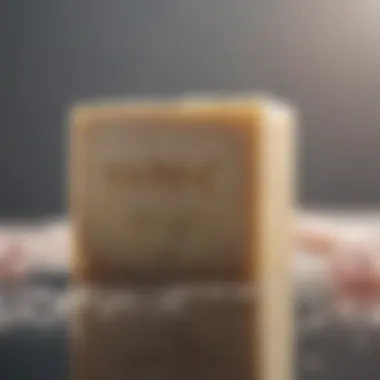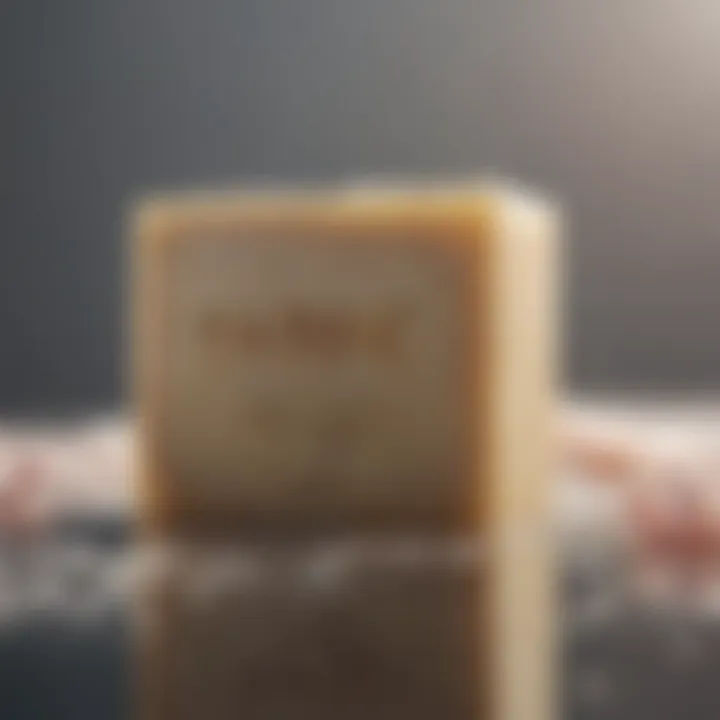Effective Soaps for Acne Management and Care


Intro
Acne is a prevalent condition that affects individuals of all ages, particularly women. Its causes are complex, involving hormonal fluctuations, overproduction of sebum, and the presence of bacteria. With numerous treatments available, the choice of the right skincare product can feel overwhelming. Among these, soap plays a unique and significant role in managing acne. Not just a cleansing agent, specialized soaps can be tailored to target the root causes of acne.
Effective acne management starts with a good skincare routine, and soap is often the first step in this regimen. When used correctly, the right soap can help reduce breakouts, balance oil production, and improve overall skin health. This section will explore some fundamental tips and how-tos for selecting and using soaps to achieve the best outcomes in acne management.
Tips and How-Tos
Skincare Routines for Different Skin Types
Knowing your skin type is crucial in choosing the right acne-fighting soap. Here are guidelines based on common skin types:
- Oily Skin: Look for soaps containing salicylic acid or tea tree oil. These ingredients help control excess oil and prevent clogged pores.
- Dry Skin: Choose a gentle soap with hydrating properties, such as glycerin or aloe vera. It should cleanse without stripping moisture.
- Combination Skin: A balancing soap that cleanses oily areas while nourishing dry patches is essential. Ingredients like witch hazel can be beneficial.
- Sensitive Skin: Opt for fragrance-free and hypoallergenic soaps. Soaps with calming ingredients like chamomile or calendula work well.
Consistent use of the right soap can help maintain a clear complexion over time. Aim for a twice-daily routine, cleansing in the morning and evening. Be gentle to avoid irritating the skin, especially after breakouts.
Haircare and Styling Basics
While soap is pivotal for facial skincare, other aspects of grooming should not be ignored. Hair products can also contribute to acne, especially if they contain heavy oils. To avoid exacerbating acne on the forehead or around the hairline:
- Choose Non-Comedogenic Hair Products: These won't clog pores. Look for labels that specify this.
- Keep Hair Clean: Regular washing helps to prevent hair oil from transferring to the skin.
Incorporating the right soap and haircare products minimizes the chances of breakouts, enhancing the effectiveness of your overall skincare strategy.
"Effective skincare is about more than just products; it’s a comprehensive approach that considers lifestyle and daily habits."
Finale
Prolusion to Acne Management
Acne remains a significant concern for many, affecting individuals across various ages and backgrounds. The impact of acne extends beyond physical appearance; it can affect self-esteem and social interactions. Therefore, understanding how to manage acne effectively is crucial.
Proper management methods, including skincare routines, can reduce breakouts and promote healthier skin. This article emphasizes the role of soap as a foundational element in acne treatment. Soaps can help cleanse the skin, remove excess oil, and prepare the skin for subsequent treatments. Moreover, the right type of soap, combined with beneficial ingredients, can have a significant impact on acne management and overall skin health.
Understanding the various approaches to managing acne is vital. It helps in recognizing what methods work best for different skin types and individual needs. By focusing on skin care and hygiene with effective soaps, women can better combat acne. As we delve deeper into the subject, we will explore not only the science behind soaps but also practical strategies for their use in daily routines.
The Science of Soap and Acne
The role of soap in managing acne is more than just a matter of cleanliness. Understanding the science behind soap and its interaction with the skin is crucial for anyone seeking effective acne treatment. This section unfolds the complexities involved in how soap works to combat acne, examining both its functional properties and its limitations. With the myriad options available in the market, it becomes essential to grasp the basic science before selecting a product that aligns with individual skin care needs.
How Soap Interacts with Skin
Soap serves as a surfactant, which means it lowers the surface tension of water, allowing it to mix more effectively with oils and dirt. This property is significant for those dealing with acne, as excess oil and impurities can contribute to breakouts. The interaction of soap with skin occurs on a molecular level. When applied, soap molecules attach to dirt and oil. As you rinse with water, these bonded molecules are washed away, leading to cleaner skin.
However, not all soaps are suitable for acne-prone skin. Harsh soaps can strip the skin of its natural oils, leading to dryness and irritation. Thus, a delicate balance must be struck. Soaps designed for acne management should ideally remove impurities without compromising the skin's moisture barrier.
Skin types play an essential role in how soap interacts with them. Oily skin may benefit from soaps that contain salicylic acid, while dry skin might be better served by moisturizing formulas. This diversity in skin types necessitates understanding your individual needs before selecting a soap product.
Soap as a Delivery System
Beyond cleansing, soap acts as a delivery system for active ingredients that target acne. Ingredients such as salicylic acid or benzoyl peroxide are often incorporated into soap formulations. These compounds have specific properties that benefit acne-prone skin. Salicylic acid penetrates pores, helping to unclog them and reduce inflammation. Benzoyl peroxide has antibacterial properties that eliminate the bacteria responsible for acne, reducing the severity of breakouts.
The effectiveness of these ingredients largely depends on their ability to be delivered efficiently to the skin. Soap facilitates this delivery by ensuring that these active agents are spread evenly across the skin surface during cleansing.
Key Ingredients to Look For
When selecting soaps that target acne, it is essential to focus on the ingredients. These components greatly influence the soap's effectiveness and its compatibility with different skin types. Knowing what to look for allows individuals to make informed choices to support their skin health.
Salicylic Acid
Salicylic acid is a well-researched beta hydroxy acid known for its exfoliating properties. It helps to penetrate into the pores, dissolving debris and excess oil that can lead to blemishes. In particular, salicylic acid is effective against whiteheads and blackheads. It works by unclogging pores and reducing inflammation.
- Benefits:
- Considerations:


- Assists in preventing breakouts.
- Helps diminish the appearance of acne scars.
- It may cause dryness in some skin types.
- Start with lower concentrations and observe skin response.
Incorporating salicylic acid into a soap formula can provide a targeted approach for individuals with oily or combination skin.
Benzoyl Peroxide
Benzoyl peroxide is another potent ingredient that is often used in acne treatments. Its primary function is to kill acne-causing bacteria on the skin. Additionally, benzoyl peroxide helps to clear out excess oil and dead skin cells, working to prevent future breakouts.
- Benefits:
- Considerations:
- Reduces inflammation and redness associated with acne.
- Can show results within a few days of use.
- It can be irritating for sensitive skin types.
- Proper usage guidelines should be followed to minimize side effects.
For many, soaps enriched with benzoyl peroxide can significantly improve skin conditions when used appropriately.
Natural Alternatives
Natural alternatives are gaining traction in acne management. Ingredients such as tea tree oil and aloe vera are frequently found in formulations aiming to soothe and heal inflamed skin. These natural substances provide gentle yet effective options for those who prefer to avoid synthetic additives.
- Benefits:
- Considerations:
- Often less irritating compared to conventional acne treatments.
- Can help maintain skin's natural moisture levels.
- Efficacy may vary among individuals.
- It is crucial to ensure that natural ingredients are used properly to avoid adverse reactions.
"Natural ingredients offer a holistic approach to skincare, appealing particularly to those concerned with added chemicals."
In summary, recognizing key ingredients such as salicylic acid, benzoyl peroxide, and various natural alternatives can empower individuals to choose the most suitable soaps for acne management. Each ingredient exhibits distinct properties and benefits that cater to diverse skin types and concerns.
Types of Soaps for Acne Management
Understanding the various types of soaps available for acne management is crucial for effectively addressing skin concerns. Each type offers unique benefits, and selecting the right one depends on individual skin needs and goals. The effectiveness of soap in managing acne relies not only on its active ingredients but also on its overall formulation and intended purpose. Therefore, it is beneficial to explore different soap categories and their specific advantages.
Antibacterial Soaps
Antibacterial soaps are particularly valuable in combatting acne because they focus on reducing bacteria on the skin's surface. Bacteria, specifically Propionibacterium acnes, can contribute to acne flare-ups. By using antibacterial soaps, people can help diminish this bacteria, thus potentially lowering the incidence of breakouts.
Many antibacterial soaps include ingredients like triclosan or benzoyl peroxide. These compounds are known for their effectiveness against harmful microbes. Regular use can also assist in preventing pore blockage, a primary trigger of acne.
Some important points for consideration when choosing antibacterial soaps include:
- Skin Sensitivity: Some formulations can be too harsh, leading to irritation or dryness. It is advisable to choose products designed for sensitive skin.
- pH Balance: Maintaining the skin's natural pH is essential for overall health, as overly alkaline products can disrupt the skin barrier.
Exfoliating Soaps
Exfoliating soaps are designed to help remove dead skin cells, which can accumulate and cause clogged pores. This type of soap often contains salicylic acid, alpha hydroxy acids (AHAs), or natural exfoliants like jojoba beads.
Exfoliating can lead to several advantages for acne-prone skin:
- Improved Texture: By clearing dead skin, exfoliating soaps can create a smoother skin feel.
- Reduced Breakouts: With fewer dead skin cells trapping oil and bacteria, the likelihood of developing acne can decrease significantly.
However, it is essential to avoid over-exfoliation, which can lead to redness and irritation. Using these soaps two to three times a week can often yield the best results without compromising skin integrity.
Moisturizing Soaps
The role of moisturizing soaps may seem counterintuitive for acne management; however, hydration is vital for maintaining skin health. Many acne treatments can be drying, and keeping the skin hydrated helps balance oil production.
Moisturizing soaps often contain ingredients such as glycerin, shea butter, or coconut oil. These components can help soothe and replenish the skin.
Key considerations when selecting moisturizing soaps:
- Non-Comedogenic: Ensure the soap does not clog pores, which could lead to further breakouts.
- Hydrating Ingredients: Look for soaps enriched with hydrating properties that can soothe while also being effective against acne.


Potential Challenges and Considerations
Understanding potential challenges when using soap for acne management is crucial. While soap can be effective, it comes with risks that users must navigate. This section explores skin irritation, how to select the appropriate soap, and the dangers of over-cleansing. These aspects provide a comprehensive view regarding what users should anticipate and consider before integrating soap into their skincare routine.
Skin Irritation
Skin irritation is a common concern among users of acne-fighting soaps. Ingredients such as salicylic acid or benzoyl peroxide can effectively battle acne but may also lead to dryness, redness, or irritation. This happens due to the active components in these soaps that can strip the skin of natural oils. Consequently, users with sensitive skin should proceed cautiously.
To minimize irritation, it is advisable to start with a patch test. Apply a small amount of soap on an inconspicuous skin area and observe for any adverse reactions over 24 hours. Additionally, consider soaps labeled as hypoallergenic or specifically formulated for sensitive skin. These products often contain gentle ingredients that cleanse without causing distress.
Choosing the Right Soap
Selecting the right soap is another critical consideration. Not all soaps are created equal. Some may provide benefits while others could exacerbate existing skin conditions. Consider the following factors:
- Skin Type: Identify whether your skin is oily, dry, or combination. For oily skin, lookout for foaming cleansers, while creamy formulations may suit dry skin.
- Ingredients: Look for active ingredients that align with your acne treatment goals.
- Fragrance-Free Options: Fragrance can irritate skin, so opt for unscented products whenever possible.
Moreover, checking product reviews and dermatologist recommendations can lead to more informed choices. Users often share their experiences, providing valuable insights into how different soaps perform.
Over-Cleansing Risks
Over-cleansing is a substantial risk when managing acne with soap. The inclination to wash the face multiple times a day may seem beneficial but can have detrimental effects.
Excessive cleansing can disrupt the skin's natural barrier, resulting in increased oil production. This can ultimately create an environment that worsens acne rather than improves it. Signs of over-cleansing include persistent dryness, irritation, and more breakouts.
It is advisable to limit washing the face to twice daily. Using lukewarm water rather than hot or cold can also help in maintaining balance without stripping away essential moisture.
"Understanding how to use soap effectively is just as crucial as the choice of ingredients in acne management."
Applying Soap for Best Results
Using soap effectively is a critical component in managing acne. Selecting the right soap is only part of the equation. The application technique and frequency of use also play significant roles in achieving the desired skincare results. Proper application maximizes the benefits of the soap while minimizing potential irritation. This section provides insight into techniques for applying soap and guidance on how often to use it, ensuring you can leverage its full potential in your skincare routine.
Proper Application Techniques
The way you apply soap can influence how well it works. Here are some essential techniques to consider:
- Clean Hands: Always start with clean hands. This prevents the transfer of bacteria from your hands to your face, which can contribute to breakouts.
- Wet the Skin: Begin by wetting your face with lukewarm water. Hot water can dry out the skin, and cold water may not effectively help in removing dirt and oils.
- Lathering: Take a small amount of soap and lather it in your hands. This process helps to activate the active ingredients in the soap, allowing them to work better on the skin.
- Gentle Application: Apply the lathered soap gently to your face in circular motions. Avoid using too much pressure, as harsh scrubbing can irritate the skin and worsen acne.
- Rinse Thoroughly: After applying, rinse your face well with lukewarm water to remove all soap residue. Leftover soap can lead to irritation or clogged pores.
- Pat Dry: Instead of rubbing your face with a towel, gently pat it dry. This helps to prevent additional irritation.
By following these techniques, you optimize the efficiency of your chosen soap, enhancing its potential benefits for acne management.
Frequency of Use
Determining how frequently to use soap in your skincare regimen is pivotal. Over-washing can strip the skin of its natural oils, leading to irritation and increased breakouts. On the other hand, infrequent washing may allow bacteria and excess oils to accumulate, exacerbating acne. Here are some guidelines to consider:
- Twice Daily: For most individuals, washing the face twice a day—once in the morning and once before bed—is sufficient. This routine helps remove dirt, oil, and other impurities.
- Listen to Your Skin: Pay attention to how your skin reacts. If you notice excessive dryness or irritation, you may need to reduce the washing frequency or switch to a gentler soap.
- Post-Workout Care: If you exercise and sweat heavily, it’s advisable to wash your face afterward. Sweat can mix with oils and dirt on the skin, potentially leading to breakouts.
- Adjust in Different Seasons: Your skin may change with the seasons. In hot, humid weather, you might require more frequent washing, whereas, in cold, dry conditions, reduce the frequency to prevent drying out your skin too much.
Finding the right balance in how often you apply soap is crucial for maintaining clear skin while avoiding irritation. Adjust these frequencies as necessary to match your skin's unique needs.
At-Home Remedies with Soap
Using soap as an at-home remedy for acne can be a practical approach to managing breakouts. Many individuals seek alternatives or complementary solutions to commercially available products. Soaps can provide a balanced way to cleanse the skin and reduce the presence of bacteria while being accessible and easy to use. The customization aspect of at-home remedies empowers users to tailor products to suit their specific skin types and concerns.
DIY Soap Formulations
Creating do-it-yourself soap formulations can be an engaging and beneficial endeavor. Several natural ingredients, known for their skin-friendly properties, can be used to enhance the effectiveness of the soap. For example, incorporating tea tree oil or lavender oil can provide antibacterial benefits. Likewise, adding ingredients such as oatmeal or honey can help soothe irritated skin. Here are a few steps to consider while making DIY soap:
- Choose a Base: Select a gentle soap base. Glycerin soap or goat milk soap works well.
- Add Active Ingredients: Consider adding essential oils. Tea tree oil at a concentration of 1-2% is often effective against acne.
- Include Exfoliants: Oatmeal can be a gentle exfoliant that softens skin.
- Mold and Cure: Pour the mixture into molds and allow it to harden completely.
This approach not only provides a personal touch but also ensures that harmful chemicals are minimized.
Combining Soap with Other Ingredients
Another effective method for using soap in acne management is combining it with other beneficial ingredients. While soap itself is a good cleansing agent, pairing it with items such as aloe vera, witch hazel, or coconut oil can enhance its efficacy. For instance, aloe vera can provide added moisture and healing benefits, which are crucial for those whose skin may become overly dry from cleansing. Consider these combinations:
- Soap + Aloe Vera: This can create a hydrating blend that calms inflammation.
- Soap + Witch Hazel: Known for its astringent properties, it can tighten pores and reduce oiliness.
- Soap + Coconut Oil: This can boost moisture retention while still cleansing the skin efficiently.


All these combinations should be used based on individual skin sensitivities. Testing a small area on the skin before widespread application is advisable.
"Custom soap formulations allow individuals to harness the properties of natural ingredients for desired results."
Implementing these at-home remedies can create a comprehensive acne management strategy that is both effective and satisfying, appealing to those who prefer informed, controlled choices in their skincare regimens.
Expert Recommendations
In the quest for effective acne management, the recommendations from experts hold significant value. Dermatologists and skincare specialists provide insights based on clinical studies and practical experiences with various soaps. Their perspectives allow individuals to navigate the market thoughtfully, seeking products that will genuinely aid in acne treatment rather than exacerbate the issue.
Dermatologist Insights
Dermatologists often highlight the importance of selecting soap that aligns with one's skin type and acne severity. For example, a dermatologist may suggest soaps containing salicylic acid for those with oily skin and mild to moderate acne. This ingredient effectively penetrates pores, dissolving sebum and dead skin cells that can contribute to breakouts.
Conversely, those with sensitive skin might benefit from gentle, hydrating soaps that contain natural ingredients. A recommendation may include soap with chamomile or aloe vera, known for their soothing properties.
Many dermatologists also emphasize the importance of patch testing new products before full application. This step helps to confirm that the soap will not cause irritation or adverse reactions. They advise looking for labels indicating "non-comedogenic" to ensure that the soap won’t clog pores. The insights of these professionals guide consumers toward informed decisions, minimizing risks and maximizing benefits.
User Testimonials
User testimonials are another rich source of practical information regarding soap effectiveness. Many women share their experiences with specific products, detailing what worked and what did not. For example, a user might report significant improvement using CeraVe Hydrating Cleanser, specifically noting that it did not strip her skin of essential moisture while controlling her acne.
Others may mention how Neutrogena Oil-Free Acne Wash cleared their breakouts within weeks, attributing its success to the presence of benzoyl peroxide.
When examining testimonials, it is important for consumers to consider the context of individual skin types and personal experiences. Not every product will work universally; thus, contrasting reviews can often provide a balanced view of a soap's effectiveness.
The Future of Soap in Acne Treatment
The landscape of acne treatment is changing rapidly, and soap is playing a pivotal role in this evolution. Understanding the future of soap in acne management is crucial for women who seek effective skincare solutions. While traditional products have served well, the increasing demand for personalized and innovative skincare is steering the industry towards new formulations and delivery methods that take advantage of advanced scientific knowledge. This section will discuss innovative ingredients and emerging trends in acne solutions, illustrating the path soap products may follow in addressing acne in the years to come.
Innovative Ingredients on the Horizon
Future formulations of soap designed for acne management are expected to incorporate innovative ingredients, pushing the boundaries of what these products can achieve. Not only do consumers look for immediate results, but they are also gravitating towards products that offer long-term skin health benefits.
Some promising ingredients include:
- Probiotics: Known for balancing the skin microbiome, probiotics can reduce inflammation and fight acne-causing bacteria.
- Peptides: These smaller chains of amino acids can aid in skin repair and regeneration, potentially reducing acne scars.
- Marine extracts: Derived from seaweed and other ocean ingredients, they exhibit anti-inflammatory properties and can provide hydration without clogging pores.
"The use of probiotics and other natural extracts in soaps may revolutionize how we treat acne, focusing on holistic skin health rather than just addressing symptoms."
Such innovative ingredients can lead to soaps that not only cleanse but also actively work to improve skin texture and appearance over time. With continued research and development, more effective combinations of these ingredients are likely to emerge.
Emerging Trends in Acne Solutions
The focus on acne management through soap is not just about ingredients; it's also about how these products fit into a broader skincare regimen. The future will see an emphasis on multi-functionality in soap products. Consumers want items that serve several purposes. Soaps that not only cleanse but also moisturize, exfoliate, or protect from environmental stressors will be in high demand.
Several trends are already emerging in this area:
- Customizable soaps: Companies may introduce options that allow users to select specific ingredients based on their skin needs, paving the way for tailored skincare solutions.
- Sustainable practices: Eco-friendly ingredients and packaging are becoming more popular. Women are increasingly interested in products that do not harm the environment while delivering results.
- Digital integration: As technology advances, we may see soaps that come with app support. This could involve tracking acne flare-ups or guiding consumers through tailored skincare routines.
These trends point towards a future where soap is not just a cleansing agent but a comprehensive tool in managing acne effectively. As the industry evolves, staying informed on these developments can empower women to choose the best products for their specific needs.
Culmination
Discussing the role of soap in managing acne is critical in skincare. The right soap can significantly influence acne outcomes by promoting cleaner, healthier skin. This section will highlight the essential elements contributing to effective acne management through soaps, while also considering the intricacies involved.
Summarizing Key Takeaways
In summary, understanding how specific soaps aid in acne treatment involves recognizing their active ingredients, their mechanisms, and the various types that cater to different skin needs. Here are the key takeaways:
- Choosing the Right Ingredients: Ingredients like salicylic acid and benzoyl peroxide can effectively combat acne. Knowing which ingredient suits your skin type can enhance results.
- Types of Soap: Not all soaps are created equal. Antibacterial, exfoliating, and moisturizing soaps each offer unique advantages for acne-prone skin.
- Potential Challenges: Maintaining skin health while managing acne is delicate. Over-cleansing and irritation must be avoided to prevent exacerbating breakouts.
- Proper Usage: Application techniques and frequency of soap usage are vital for effectiveness. Incorrect use can hinder acne management.
While this may seem straightforward, the nuances of soap and its relationship to acne prevention and treatment are profound.
Encouraging Informed Choices
Empowering individuals to make informed choices about acne management through soap is crucial. Each choice should be based on a thoughtful consideration of skin type and specific acne challenges. Women of all ages should embrace the following strategies:
- Research Products: Always read labels and select products that highlight effective ingredients.
- Get Professional Advice: Consulting with dermatologists can provide personalized recommendations tailored to skin types and acne severity.
- Test New Products: When trying new soaps, start with small amounts to assess for sensitivity or adverse reactions.
Actively engaging in the selection process helps women establish a routine that is not only beneficial but is also empowering. Acne management through soap is an ongoing journey that can vary greatly from person to person. By understanding the factors at play, women can navigate their options with confidence.







